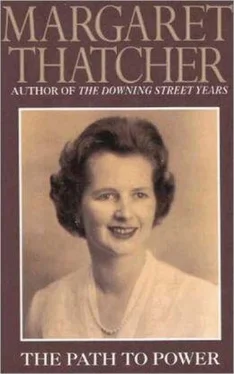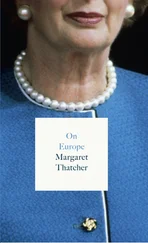Margaret Thatcher - The Path to Power
Здесь есть возможность читать онлайн «Margaret Thatcher - The Path to Power» весь текст электронной книги совершенно бесплатно (целиком полную версию без сокращений). В некоторых случаях можно слушать аудио, скачать через торрент в формате fb2 и присутствует краткое содержание. Город: New York, Год выпуска: 2010, ISBN: 2010, Издательство: HarperCollins, Жанр: Биографии и Мемуары, на английском языке. Описание произведения, (предисловие) а так же отзывы посетителей доступны на портале библиотеки ЛибКат.
- Название:The Path to Power
- Автор:
- Издательство:HarperCollins
- Жанр:
- Год:2010
- Город:New York
- ISBN:0-06-017270-3
- Рейтинг книги:3 / 5. Голосов: 1
-
Избранное:Добавить в избранное
- Отзывы:
-
Ваша оценка:
- 60
- 1
- 2
- 3
- 4
- 5
The Path to Power: краткое содержание, описание и аннотация
Предлагаем к чтению аннотацию, описание, краткое содержание или предисловие (зависит от того, что написал сам автор книги «The Path to Power»). Если вы не нашли необходимую информацию о книге — напишите в комментариях, мы постараемся отыскать её.
, Margaret Thatcher provided an acclaimed account of her years as Prime Minister. This second volume reflects on the early years of her life and how they influenced her political career.
The Path to Power — читать онлайн бесплатно полную книгу (весь текст) целиком
Ниже представлен текст книги, разбитый по страницам. Система сохранения места последней прочитанной страницы, позволяет с удобством читать онлайн бесплатно книгу «The Path to Power», без необходимости каждый раз заново искать на чём Вы остановились. Поставьте закладку, и сможете в любой момент перейти на страницу, на которой закончили чтение.
Интервал:
Закладка:
In any case, the conflict was soon upon us. Germany invaded Poland on 1 September 1939. When Hitler refused to withdraw by 11 a.m. on Sunday 3 September in accordance with Britain’s ultimatum we were waiting by the radio, desperate for the news. It was the only Sunday in my youth when I can remember not attending church. Neville Chamberlain’s fateful words, relayed live from the Cabinet Room at No. 10, told us that we were at war.
It was natural at such times to ask oneself how we had come to such a pass. Each week my father would take two books out of the library, a ‘serious’ book for himself (and me) and a novel for my mother. As a result, I found myself reading books which girls of my age would not generally read. I soon knew what I liked — anything about politics and international affairs. I read, for instance, John Strachey’s The Coming Struggle for Power , which had first appeared in 1932. The contents of this fashionable communist analysis, which predicted that capitalism was shortly to be superseded by socialism, seemed to many of my generation exciting and new.
But both by instinct and upbringing I was always a ‘true blue’ Conservative. No matter how many left-wing books I read or left-wing commentaries I heard, I never doubted where my political loyalties lay. Such an admission is probably unfashionable. But though I had great friends in politics who suffered from attacks of doubt about where they stood and why, and though of course it would take many years before I came to understand the philosophical background to what I believed, I always knew my mind. In this I can see now that I was probably unusual. For the Left were setting the political agenda throughout the thirties and forties, even though the leadership of Churchill concealed it during the years of the war itself. This was evident from many of the books which were published at about this time. The Left had been highly successful in tarring the Right with appeasement, most notably in Victor Gollancz’s Left Book Club, the so-called ‘yellow books’. One in particular had enormous impact: Guilty Men, co-authored by Michael Foot, which appeared under the pseudonym ‘Cato’ just after Dunkirk in 1940.
Robert Bruce Lockhart’s best-selling Guns or Butter? appeared in the autumn of 1938, after Munich. Lockhart’s travels through Europe led him to Austria (now Nazi-controlled after the Anschluss) and then to Germany itself at the height of Hitler’s triumph. There the editor of a German national newspaper is reported as telling him that ‘Germany wanted peace, but she wanted it on her own terms.’ The book ends with Lockhart, woken by ‘the tramp of two thousand feet in unison’, looking out of his window onto a misty dawn, where ‘Nazi Germany was already at work’.
A more original variation on the same theme was Douglas Reed’s Insanity Fair. This made a deep impression on me. Reed witnessed the persecution of the Jews which accompanied the advance of Nazi influence. He described the character and mentality — alternately perverted, unbalanced and calculating — of the Nazi leaders. He analysed and blisteringly denounced that policy of appeasement by Britain and France which paved the way for Hitler’s successes. Written on the eve of the Anschluss, it was powerfully prophetic.
Out of the Night by Jan Valtin — pen name for the German communist Richard Krebs — was lent to my father by our future MP Denis Kendall. It was such strong meat that my father forbade me to read it — but in vain. When he went out to meetings I would take it down from the shelf on which it was hidden and read its spine-chilling account of totalitarianism in action. It is, in truth, an unsuitable book for a girl of sixteen, full of scenes of sadistic violence whose authenticity makes them still more horrifying. The appalling treatment by the Nazis of their victims is undoubtedly the most powerful theme. But underlying it is another, just as significant. For it describes how the communists set out in cynical alliance with the Nazis to subvert the fragile democracy of Germany by violence in the late twenties and early thirties. That same alliance against democracy would, of course, be replicated in the Nazi-Soviet pact of 1939 to 1941 which destroyed Poland, the Baltic states and Finland and plunged the world into war. The book undoubtedly contributed to my growing belief that Nazism (national socialism) and communism (international socialism) were but two sides of the same coin.
A book which had a particular influence on me was the American Herbert Agar’s A Time for Greatness, which appeared in 1944. This was a strangely powerful analysis of how the West’s moral failure allowed the rise of Hitler and the war which had followed. It urged a return to Western liberal democratic values and — though I liked this less — a fair amount of left-wing social engineering. For me the important message of Agar’s book was that the fight against Hitler had a significance for civilization and human destiny which exceeded the clash of national interests or spheres of influence or access to resources or any of the other — doubtless important — stuff of power politics.
Agar also wrote of the need, as part of the moral regeneration which must flow from fighting the war, to solve what he called ‘the Negro problem’. I had never heard of this ‘problem’ at all. Although I had seen some coloured people on my visit to London, there were almost none living in Grantham. Friends of ours once invited two American servicemen — one black, one white — stationed in Grantham back to tea and had been astonished to detect tension and even hostility between them. We were equally taken aback when our friends told us about it afterwards. This sort of prejudice was simply outside our experience or imagination.
Like many other young girls in wartime, I read Barbara Cart-land’s Ronald Cartland, the life of her brother, a young, idealistic Conservative MP, who had fought appeasement all the way and who was killed at Dunkirk in 1940. In many ways her most romantic book, it was a striking testament to someone who had no doubt that the war was not only necessary but right, and whose thinking throughout his short life was ‘all of a piece’, something which I always admired. But the sense that the war had a moral significance which underlay the fear and suffering — or in our family’s case in Grantham the material dreariness and mild deprivation — which accompanied it, was perhaps most memorably conveyed by Richard Hillary’s The Last Enemy. The author — a young pilot — portrays the struggle which had claimed the lives of so many of his friends, and which would claim his own less than a year later, as one which was also being fought out in the human heart. It was a struggle for a better life in the sense of simple decency.
A generation which, unlike Richard Hillary, survived the war felt this kind of desire to put things right with themselves, their country and the world. As I would come to learn when dealing with my older political colleagues, no one who fought came out of it quite the same person as went in. Less frequently understood, perhaps, is that war affected deeply, if inevitably less powerfully, people like me who while old enough to understand what was happening in the conflict were not themselves in the services. Those who grow up in wartime always turn out to be a serious-minded generation. But we all see these great calamities with different eyes, and so their impact upon us is different. It never seemed to me, for example, as it apparently did to many others, that the ‘lesson’ of wartime was that the state must take the foremost position in our national life and summon up a spirit of collective endeavour in peace as in war.
The ‘lessons’ I drew were quite different. The first was that the kind of life that the people of Grantham had lived before the war was a decent and wholesome one, and its values were shaped by the community rather than by the government. Second, since even a cultured, developed, Christian country like Germany had fallen under Hitler’s sway, civilization could never be taken for granted and had constantly to be nurtured, which meant that good people had to stand up for the things they believed in. Third, I drew the obvious political conclusion that it was appeasement of dictators which had led to the war, and that had grown out of wrong-headed but decent impulses, like the pacifism of Methodists in Grantham, as well as out of corrupt ones. One can never do without straightforward common sense in matters great as well as small. And finally I have to admit that I had the patriotic conviction that, given great leadership of the sort I heard from Winston Churchill in the radio broadcasts to which we listened, there was almost nothing that the British people could not do.
Читать дальшеИнтервал:
Закладка:
Похожие книги на «The Path to Power»
Представляем Вашему вниманию похожие книги на «The Path to Power» списком для выбора. Мы отобрали схожую по названию и смыслу литературу в надежде предоставить читателям больше вариантов отыскать новые, интересные, ещё непрочитанные произведения.
Обсуждение, отзывы о книге «The Path to Power» и просто собственные мнения читателей. Оставьте ваши комментарии, напишите, что Вы думаете о произведении, его смысле или главных героях. Укажите что конкретно понравилось, а что нет, и почему Вы так считаете.












